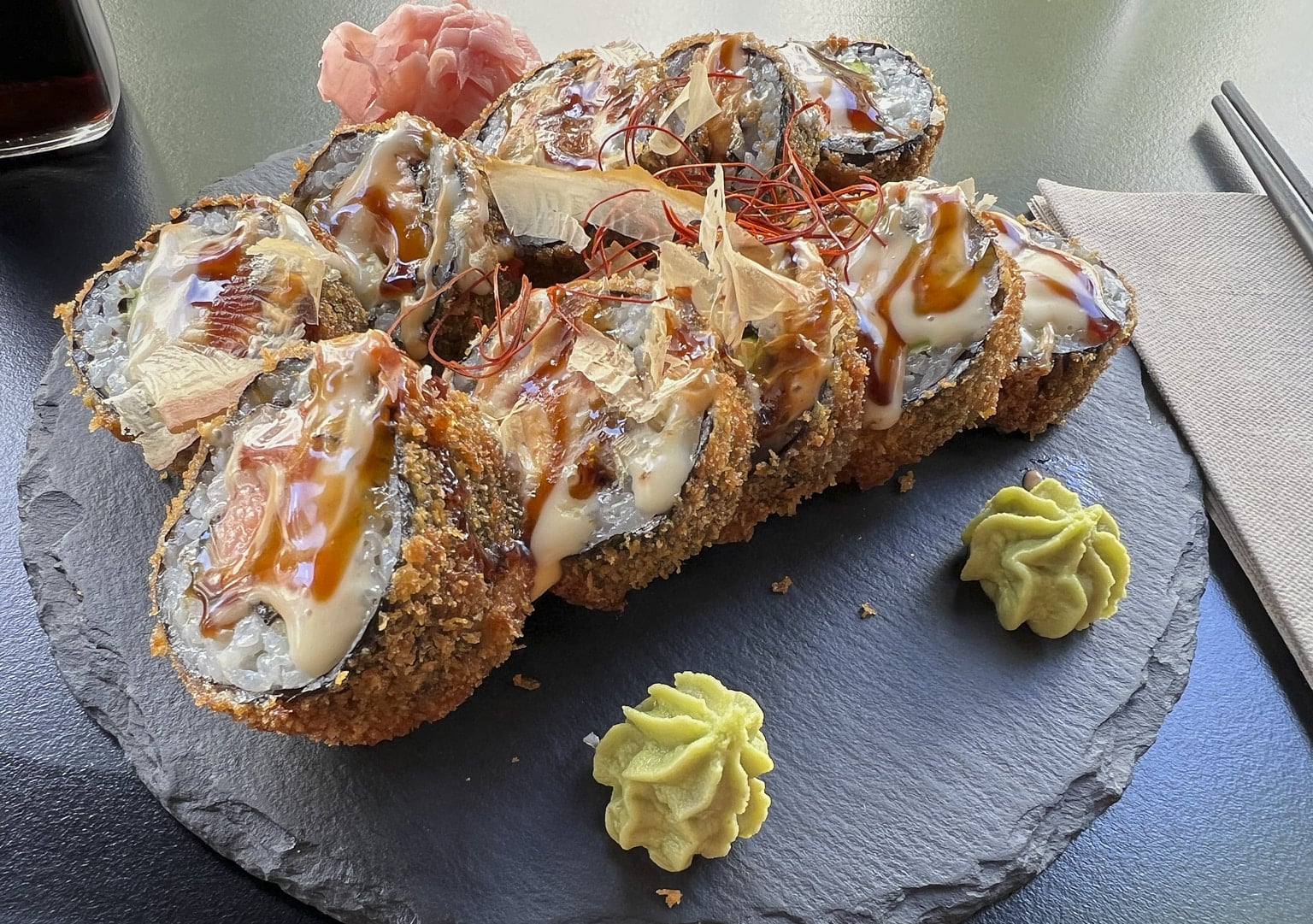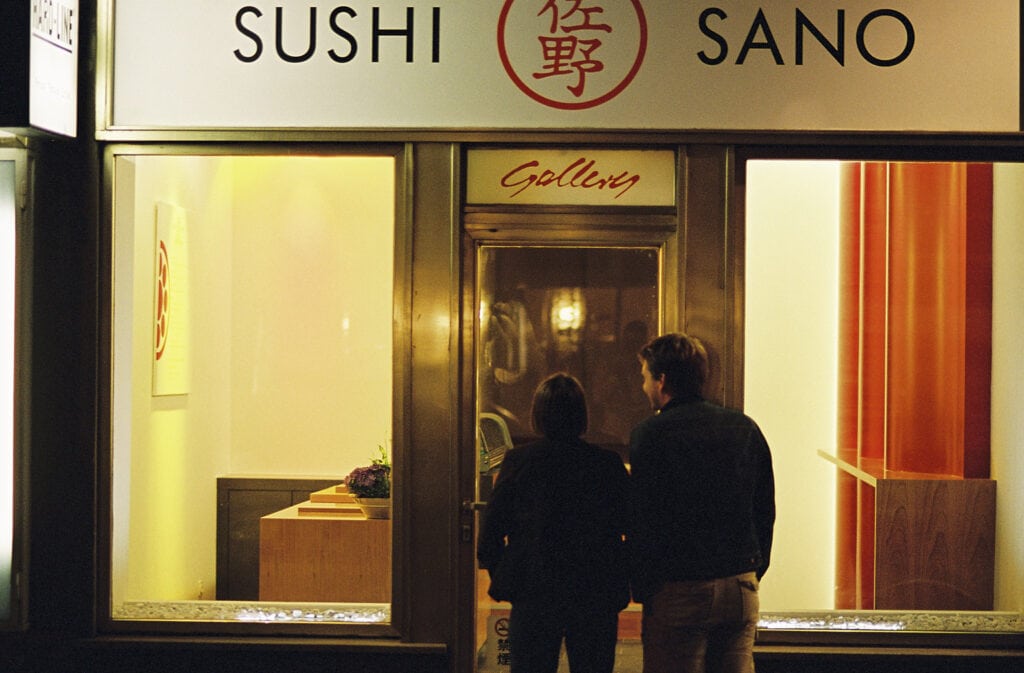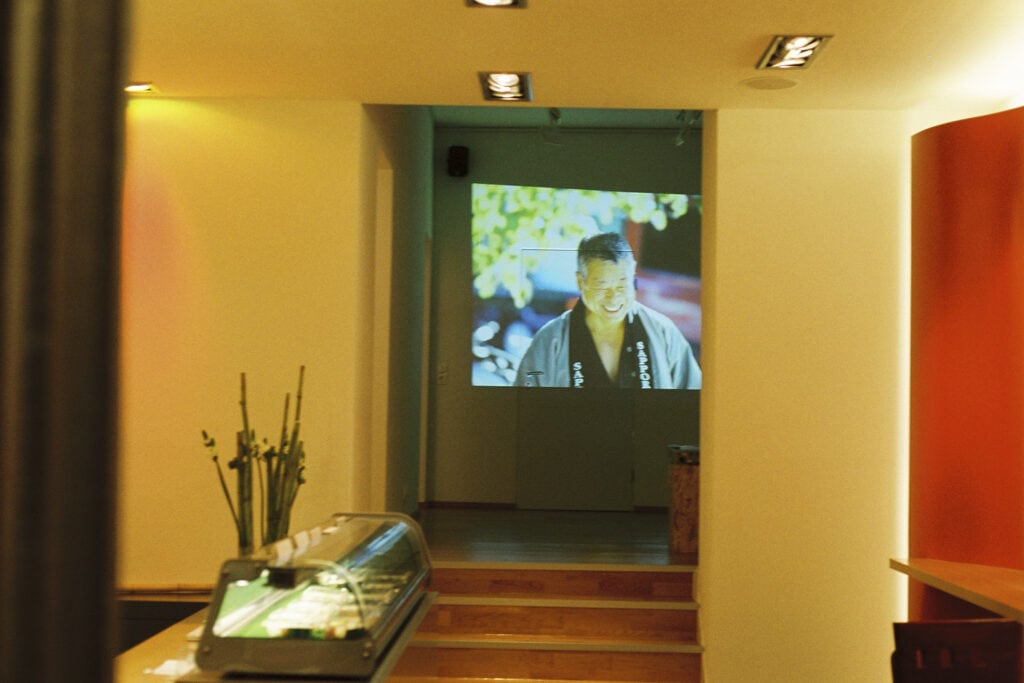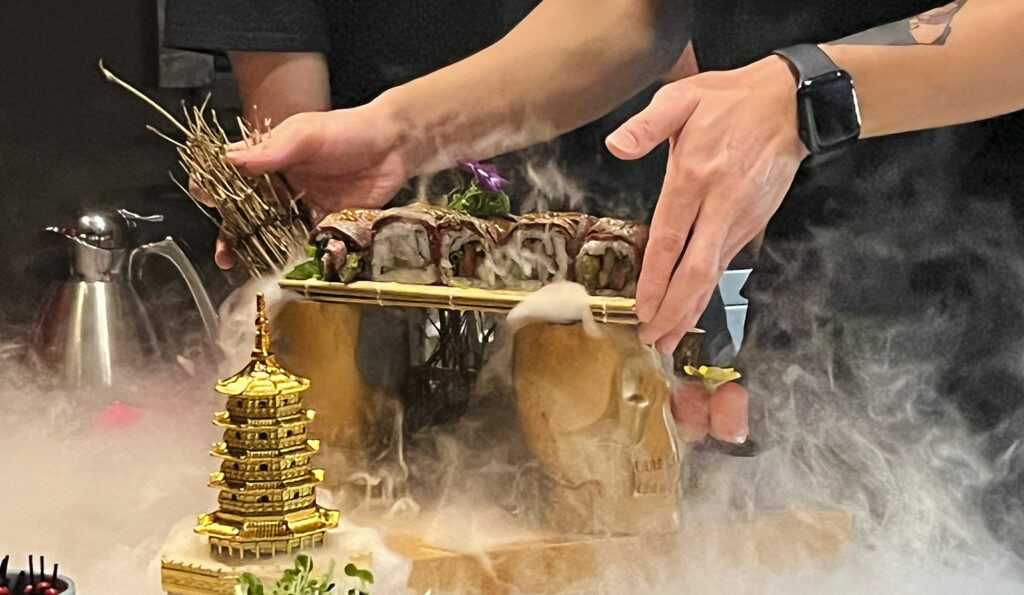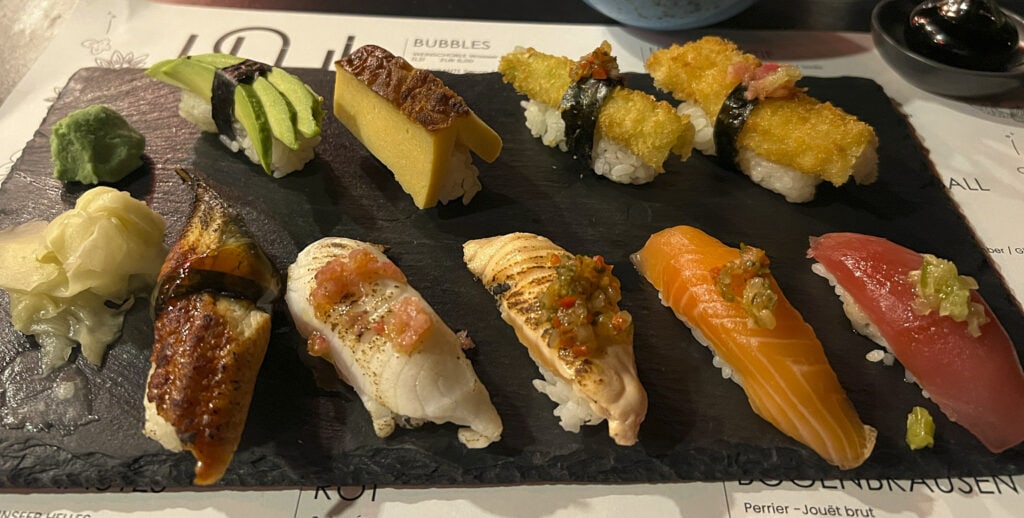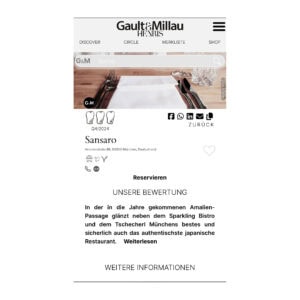Munich, the capital of Bavaria, is the place to be for good japanese cuisine and real Sushi very thin, we agree with many sushi lovers and Japanese chefs. And not because there is so much good competition - but unfortunately a lot of bad.
In this article, we give a small overview of how we perceive the current status of sushi in Munich and which restaurants we have chosen in addition to our Restaurant Sansaro can recommend in good conscience.
How we judge Japanese restaurants
Of course, there is one thing to keep in mind: Everyone judges food differently.
We have been intensively involved with Japanese gastronomy, Japanese culture since the 1990s - from different angles and constantly developing our own knowledge and taste.
There are as many opinions on the Internet as there are people in the world. We find many enthusiastic reviews for restaurants that turn our stomachs, whether for taste or hygiene reasons.
It is in the nature of things that someone who goes to a sushi restaurant in Bogenhausen, for example, where he lives or works, always goes there to eat. He rates it highly because he always gets a friendly welcome there, it tastes good and he always feels welcome - because it's simply on the way and there may not be much else in the corner.
Unfortunately, this has nothing to do with a certain Japanese taste quality. Neither does it have to do with a constant level of cuisine, nor with whether it is worth going to this restaurant from other parts of the city.
Many of these restaurants or sushi snack bars are even rated according to the fact that it tastes good - which would be understandable - and then that you are served quickly and in a friendly manner for little money - which has absolutely nothing to do with good or bad cuisine.
Quote typical internet review:
Super restaurant. Food is prepared quickly and freshly! Also for the small price what there, under 10€ per person with whole plate sushi & drink. Gladly again. Friendly boss & boss lady. Everything neat and clean!
This cannot be the decisive benchmark for our search for good Japanese taste!
Good sushi needs expensive raw material
Good food does not have to be expensive. Good sushi, unfortunately, does.
Because if you get full with sushi for under 10 euros, there is certainly no quality. This results from the material prices alone, even before the Corona pandemic and inflation from 2022. Some people may love it - we can no longer eat such things!
The cheapest possible salmon, cheap tuna - that only works with a lot of intensive sauces, not for people who value organic, SlowFood, culinary pleasure and good food mediators. By the way, it's not just the fish: good rice is also a key cost factor in sushi.
Expensive sushi does not automatically mean good sushi
On the other hand: expensive sushi - and there are quite a few restaurants in Munich - is also not automatically good.
The chance is higher with these expensive "style restaurants" that good material is used - but mostly then the craft and the processing of the material is not given the space it needs to make good sushi or good Japanese cuisine.
Only long-term view meaningful
So we look at restaurants from the perspective of how well and how consistently they can portray real Japanese cuisine or classic Japanese sushi.
In our experience, this does not go hand in hand with Vietnamese or Thai "warm" cuisine - but at the same time, the vietnamese Kitchen section in such a restaurant can be quite excellent.
And especially in Munich, enthusiasm for some new store, some new location comes up quickly - but just as quickly this enthusiasm fades away again or the chefs who have opened a store move on again because the management has no sense for the long-term discussion of Japanese sensitivities. But the issue here is which restaurants long term, reliably a certain Japanese taste quality can map.
Spoiler: this means that many "sushi" restaurants mentioned on aggregator sites and lifestyle blogs are out. In our opinion, what is sometimes recommended as the "best sushi in Munich" should not even be called sushi.
Full assessment also includes dishes - and character
By the way, a full assessment of a Japanese restaurant involves much more than just a "always tastes good and is always friendly"..
On the contrary, Japanese service in particular can sometimes be perceived as sober or even moodless for Europeans.
Our impression is that what counts for German guests Ambience firstthen how friendly and gallantly you are received and courted and only then - at the very end! - the food.
The Japanese service worker, on the other hand, initially sees it not as their job to make the guest feel as if they were on vacation in an Italian restaurant - but rather to soberly take the order for the food correctly, avoid problems, bring the order and ensure the procedures with the kitchen.
Guests in Germany often confuse great service with top quality, simply because they (understandably) feel comfortable and flattered.
In contrast, a typical Japanese service often even seems a bit quirky.
But to fully assess a Japanese restaurant, there is much, much more: a look at the dishes, perception of small details (among others. Moritsuke), of course, a constant kitchen quality. Use of good ingredients, understanding of cultural and culinary basics and yes: the character and behavior of the restaurant operators within the group of Japanese and Japanese restaurants in Munich.
Experiences with Sushi in Munich from the last 30 years
SUSHIYA founder Alexander Reinelt studied Japanese studies in the 1990s and has since followed as a hobby with great passion and enthusiasm all Japanese restaurants and Japanese cuisine in Munich. At the beginning of the 2000s, he had founded a limited liability company together with a Japanese restaurateur and finally in 2005, with a few brave friends, SUSHIYA GmbH, which was dedicated to Japanese cuisine for Munich in reliable quality. The hobby then finally became for him the main profession within the SUSHIYA GmbH.
He is surrounded by a team of experienced Japanese chefs and service staff and younger and older Munich residents who have long been involved with Japanese cuisine and culture for reasons of personal enthusiasm or because of Japanese roots and connections.
Here is a small list of Japanese restaurants in Munich, without any claim to completeness, without any claim to absolute knowledge.
But always with the claim to speak fairly and out of love for Japanese cuisine - and probably with far more experience and look behind the scenes than on all sorts of Internet portals or rating platforms. Unfortunately, these do not help at all in the search for good sushi (for this another time an article, which is also almost ready...).
And in any case, our ratings are location-based: a restaurant we can recommend here in Munich might not succeed in a city where there is more and better Japanese competition. On the other hand, just because there are few really good Japanese restaurants in Munich, cruel taste confusions without proper sushi rice cannot therefore become a recommendation.
If you still remember other restaurants, if you want to add something to all this or even have a different opinion somewhere: With pleasure! We listen, we engage with other opinions or queries.
Sushi in Munich - an overview
One thing is here again sent ahead: There will be people who think it is inappropriate for us to comment on the market stall and some of our competitors because we ourselves have been running a Japanese restaurant in Munich for 15 years.
But we are also lovers of Japanese cuisineWe have been closely following the development of sushi and Japanese cuisine in Munich for a good thirty years - and we love to go out for Japanese food ourselves, especially consciously and with a much freer mind. And you can either read our assessments carefully and be pleased with the insight, or of course disagree with them in terms of content - or reject them unobjectively as talking about the competition. But we know from experience what we are talking about. And if anyone has a well-founded different opinion, we are open to it and look forward to your Feedback.
Another little hint: There may be a small sushi bar, a delivery service, a restaurant around the corner from you, which you find quite great and which tastes good.
However, we are referring here primarily to restaurants where you can also have a nice meal in the evening and to establishments that have a certain continuity. Otherwise, quality is too often transient, depends on a single chef, comes and goes again very quickly - especially in Munich.
In our Blog by the way, we have a small article, how to recognize (real) japanese restaurants.
Munich lives on culinary whole & appearance, instead of being & ability
There's no other way to put it: the sushi industry is currently subject to the trend of wild staging and flooding customers with stimuli in such a way that the taste of real Japanese cuisine is completely ignored.
Genuine Japanese craftsmanship is very rare to find.
This is apparently fundamentally a problem of the perception of gastronomy in Germany - in Munich, we can say, it is certainly especially true, at least for the area of Japanese cuisine & sushi.
But: Fusion sushi does not automatically have to be bad sushi.
On the contrary, in the restaurant sansaro we think that well-made fusion sushi can be the way for Japanese cuisine qualities to win the hearts and attention of people in Germany.
It is also a fact that we in Germany are used to different tastes and have not grown up with fine Japanese cuisine for decades.
When fusion is based on good basic ingredients, a knowledge and understanding of Japanese cuisine, it can be very creative and a true mastery.
But good fusion sushi isn't just combining x-variations of salmon, avocado & tuna.
Again and again in recent years we see such restaurants appear, which work with truffle oil flavors, with deep-fried sushi and especially intense sauces. This concerns nationwide known delivery services as well as numerous new restaurants in Munich and surroundings with often also Japanese names.
The perception of what is good sushi and what is not is completely blurred. Japanese cuisine is misused as a prop for good sales.
Sushi in Munich - current situation
In our view, the current market situation in the period from around 2019-2022 is as follows:
Real Japanese restaurants are becoming fewer
Fewer and fewer restaurants offer true Japanese flavor and culinary depth.
In 2022, the summer closes the legendary SushiBar in Schwabing, the multiple award-winning Restaurant Toshi. (both meanwhile slimmed down reopened)
Other restaurants like Mitani, Kitcho hardly receive any media attention, but unfortunately also do not show any innovations or special developments. And even the Haguruma, a small restaurant in the Gärtnerplatzviertel where we were ten years again and again with pleasure, seems to be threatened by the closure. (Lack of staff!)
In some cases, we are a little shocked at the way also restaurants recommended by us so far have changed in quality after the Corona pandemic! It is clearly recognizable that even Japanese-run establishments or long-standing houses known for their former quality have to resort to inferior material.
We can only hope that the people of Munich can once again pay more attention to and appreciate genuine Japanese cuisine, and that the restaurants that actually cook Japanese food can once again invest more in materials and staff.
Japanese cuisine is very elaborate, very preparation intensive - you can make your life much easier by investing less in preparation of rice, vegetables, fish and instead making thick sauces over the sushi.
In this world of everywhere available "Pseudo-Sushi", the awareness of the fine Japanese taste is also lost among customers and guests. Anyone who has ever met him and knows how much the well made japanese cuisine washoku can spread a feeling of satisfaction, regrets it very much.
Toshio Kobatake, experienced chef and Japanese Cuisine Ambassador, says many pan-Asian restaurants "stealing our Japanese culture and defacing she". As a result, the customer hardly has any orientation anymore as to what is special about sushi, what constitutes sushi and what sushi is actually supposed to taste like.
The appreciation for the fact that a "modern" sushi restaurant then not only has any sashimi ceviche constructions, new style sashimi or "sashimi" in mayo sauce on the menu, but actually a expertly cut and arranged sashimi from suitable, fresh and high-quality fish varieties, is then naturally lost.
Japanese cuisine at lunchtime hard to get in Munich
After the Corona pandemic, the situation with Japanese restaurants in Munich has changed significantly to the detriment of customers. As of summer 2022, it seems almost impossible to enjoy good Japanese cuisine at lunchtime.
Our own restaurant sansaro is still closed at lunchtime because life at and around the university has changed significantly, staff is very scarce. For us, opening at lunchtime simply doesn't pay off.
The Toshiwhich is always good for high-quality lunch menus in Munich's city center, is currently closed and its successor JapatTapa Toshibar is only open in the evenings.
The restaurant Mitani, formerly known for an unbeatably cheap and good lunch, currently opens only in the evening.
The quality at "style restaurants" like Koi, Anoki (Azuki) and so on is partly completely indiscussable at lunchtime in our estimation. (sic!)
Only chances for Japanese taste at noon currently appear from our point of view Haguruma and Kitcho or at least for ramen noodle soups and small add-ons, to be the Takumi and AOI ramen.
It turns out that if you want to enjoy Japanese taste and value quality, you really have to be grateful when you find a restaurant that offers this quality. Perhaps a change of times is on the horizon, an awareness of what good gastronomy can do and how to distinguish good sushi from bad.
Trend: Noble temples in the high price segment with a touch of sushi
Individual fine restaurants keep popping up in Munich, sometimes with competent Japanese chefs when they open.
However, the basic orientation of these restaurants is not authentic Japanese, but mostly pan-Asian (Geisha Group), Nikkei Kitchen (Izakaya, Koi, etc.) or even structurally system gastronomy (Do & Co Restaurant).
The menu is usually geared toward not demanding patience from diners for sophisticated craftsmanship, but quickly satisfying requests for impressive arrangements and quickly bringing a variety of "sharing-size" dishes to the table. Ultimately, it's about a kitchen that can quickly deliver something that appears impressive, can handle a large number of guests, and a service that can sell in a very trained and structured manner.
In such restaurants there are recently very creative and bombastic sushi creations, with pleasure also with an accumulation of countless ingredients in a single role, garnished with truffle oil or flambéed, served on slate plates from the catering wholesale or any, completely unJapanese stair constructions or also very often recently with dry ice.
In our experience, however, these sushi creations are usually very banal and one-sided. This usually has nothing to do with real Japanese cuisine or Japanese gastronomy.
It may simply be that intense flavors such as truffles or a thick sauce that act Nigiri or actually simple Hosomaki soak.
But at the same time this reveals an absolute lack of understanding of rice and fish and are mostly based on the cheapest available fish or tuna: with these seasonings and arrangements, the individual fish quality is completely lost, it can no longer be perceived and appreciated by the guest.
Due to the elaborate staging, 15 to 25 € per roll can then also be quickly demanded for defective material and poor craftsmanship.
We also made an interesting observation: In one of these restaurants, we found on the menu "Unagi Shirayaki," a special preparation of eel, the For example, we freshly disassemble for it in our own house. To our knowledge, we are the only restaurant in Munich that makes this effort.
Served in the other restaurant but again and again only completely normal, prefabricated cut pieces of the quite normal eel "Unagi" as it comes in cheap restaurants from the plastic packaging. From our point of view, this is already a rip-off - and on the Internet, inexperienced Japanese gastro-influencers simultaneously cheer about how great this restaurant is...
Much pseudo-sushi in Munich, Japanese quality very rare
In conclusion, these observations have unfortunately formed the realization: A lot of sauce and window dressing in the vast majority of new openings, but in detail no understanding or knowledge of Japanese taste.
What in the late 1990s, early 2000s in Munich were the Chinese-run assembly-line places with inferior sushi, now in the 2020s are often Vietnamese-run, stylish stores with great décor, impressive staging, and likewise no knowledge of good Japanese cuisine.
Conveyor belt or kaiten sushi in Munich: no recommendation
For the sake of completeness, we cannot recommend any assembly-line restaurants in Munich. In our estimation, there are none that are remotely acceptable.
Yes, we went to these restaurants ourselves in the 1990s and early 2000s, ate there ourselves all the time - until the opening of our own company and the early reliance on Japanese chefs resulted in a completely different taste picture for us (and our employees at the time).
Then as now: there is no recommendable Kaitenzushi in Munich. We also don't know of any where Japanese work or Japanese chefs work.
These restaurants usually always have seemingly Japanese names such as Tokyo, Shinjuku, Tsukiji, Kyoto, Fuji, Asakusa, etc., etc.
But never have we seen a restaurant where there is rudimentary Japanese flavor. You can also calculate this well, if you know what good fish and good rice (!) costs in the purchase, how elaborate the preparation is. No wonder that at these restaurants also often many fried noodles and desserts from the freezer counter chug over the conveyor belt.
Conclusion: Keep your hands off assembly line eateries in Munich if you want to get to know and love Japanese cuisine.
Especially when you try sushi for the first time, you should go for quality, because otherwise you get used to the wrong, often artificial flavors and then try to create taste through strong seasonings etc.
Where to find (basically) good Japanese cuisine in Munich
But which restaurants in Munich can we recommend?
Als rough rule of thumb you can say that you are in the Japanese run restaurants Japanese flavor, but also financially appropriate to the level.
In detail, in our estimation, you will find Japanese flavor in Munich at these restaurants:
- Haguruma - lively restaurant in Gärtnerplatz district
- Mitani - the best karaage!
- Toshi - unfortunately closed, new location in progress
- Kaito - Japanese flair in Maxvorstadt
- Sansaro - in the middle of the Amalienpassage
- Kitcho - perhaps underestimated?
- J-Bar - rustic pub in May Street
- Shoya - several locations
- Aoi Ramen - in the Volkartstrasse
- Takumi - popular ramen chain
- Sushi Sano - convenient in the city center
In almost all other restaurants it is more of a knock-off, sometimes tired, sometimes very elegantly staged.
Note: As far as it is a restaurant in Munich and it has any relevance to the field of Japanese cuisine and / or sushi, you can be sure that we have visited it perhaps even several times and made us a picture. Even the restaurants we do not talk about here at all.
Recommended Japanese Restaurants & Sushi in Munich
Where is the best sushi in Munich?
If you google it, you'll come up with some blog articles from so-called Aggregators or also from lifestyle blogs. These sites rank on Google because of their sheer size and nationwide or even international distribution.
However, as you can see from their content, they often offer no help at all to those who are looking for good Japanese cuisine. The blogs are mostly about recommending all kinds of locations with snappy language, with the writers often dramatically have no idea about sushi and partly absolutely indisputable food quality hot recommend.
The vast majority of food and lifestyle blogs are in relation to sushi no competent contact persons and the recommendations in it are worth nothing. Some of these recommendations are a dramatic expression of complete incompetence when it comes to sushi.
If you're lucky, you'll come across posts on the web by locally experienced gastro-bloggers like. Bianca Murthy or the Japan experts Axel Schwab written and which provide a good orientation.
If you are unlucky, even reputable publications write out restaurants as recommendations that are not remotely recommendable for sushi or even Japanese cuisine in Munich. Because not every item is recommended by derem long-time experienced gastronomic experts. By the way, you also have to be careful when you, as a customer or author, base your assessment of Japanese cuisine on side factors such as the presence of Japanese guests. (What japanese Guests in Japanese restaurants abroad especially look for, on this occasion a separate article!)
A crucial point also: most of these articles suffer very much from a time-limited perspective, are like everything in life of course only a snapshot. However, the articles on large portals are partly dominant in the search on the Internet even after many, many years due to the market power of the portals.
However, in the sushi sector in particular, enormous efforts are needed to offer continuous quality in the long term - that does not completely collapse when the main sushi master goes on vacation or changes.
We have been observing the scene for almost 30 years from exactly this, long-term perspective: long-term developments, not just looking at fast trends without reflection, not confusing ambience with flavor.
We can generally recommend the following restaurants in terms of taste
(Click on the name to get to the detailed article!)
Japatapa Toshibar - the new izakaya from Toshi
Restaurant sansaro in the Amalienpassage
✺ Background ✺
Last but not least, of course, our own restaurant, the SUSHIYA (company name) sansaro (restaurant name).
The company SUSHIYA was founded in 2005 by Alexander Reinelt, a Japanese enthusiast since his early youth, and a few brave friends to offer Japanese cuisine at a fair price in Munich.
From his own experience as a frequent guest in a top sushi restaurant in Munich in the 1990s, founder Alexander Reinelt felt it was important that there should be a place in Munich where high-quality Japanese cuisine is offered - but where you feel comfortable and welcome even without a gold credit card and in a leisure outfit, as a student, lawyer, pupil, pensioner or factory worker. Say: you are welcomed with respect and joy, regardless of your status or wallet.
In 2007, we opened the sansaro restaurant, purposefully built as an interpretation of Japanese architecture: not kitschy, but understanding the basic principles and translating them into a unique ambience. In the meantime, sansaro has grown from a restaurant that has long been deeply rooted in the Amalienpassage has become an absolute insider tip and a reliable force to be reckoned with when it comes to authentic Japanese quality.
The effort that goes into Japanese gastronomy there is actually absurd. Behind the scenes, work is carried out with a depth, material and sophistication that you would otherwise only find in Michelin-starred restaurants. When the opportunity arises, a blog article on all the topics that you can find in the background here.
✺ Ambience ✺
The ambience is apparently very simple for a Japanese restaurant in Munich, the interior design sober - sometimes too sober even for us. But it's all about the essentials and that is a Japanese clarity and a formal focus on the actually extremely formalistic Japanese food culture around sushi: the sansaro is not an izayaka and not street food, it is a sushi restaurant with fine Japanese cuisine. To make good sushi takes a lot of preparation, a lot of discipline, in short a certain formality.
Inside, there's really just one large room where chefs meet with guests and service, offering simple, unpretentious seating.
The large table gives structure to the space with the restless façade of the Amalienpassage and is intended to be a meeting place for different groups of guests.
In summer, there are two large terraces outside, framed by Japanese maples that have been tended and built up over the years and a huge bamboo from the chef's garden.
The green areas of the Amalienpassage are now substantially embellished by the influence of SUSHIYA, although a sadly unsuitable gardener in 2020 has rather spoiled the look.
✺ Sushi & Hot Kitchen ✺
The sansaro has always worked with As much organic as possible and decides again and again for the best possible ingredients. Working as sustainably as possible and using as much organic as possible has been a matter of conviction and sustainability for the founder since the beginning of the company, already in the SUSHIYA BENTO STORE In 2006 in the inner city, it was like this.
In the meantime, the restaurant including delivery service is SlowFood certified, organic certified and certified as a Japanese Food Supporter. Since 2022, the sansaro also has for the first time a Mention in the Guide MICHELINwhich is an enormous motivation to continue on the path of best quality in material selection and menu decision.
The sushi selection is second to none in Munich, only the Sushi bar in the marshal street was better here for many years. After visiting countless Japanese restaurants in Munich again for this guide, including those we have always been happy to recommend, we are nonetheless amazed and even sometimes shocked at the differences in quality on the plate - and proud of what we accomplish.
The warm kitchen always offers seasonal menus or exciting Events around Japanese cuisine, whereby, for example, at the popular tasting events, emphasis is placed on always developing new, individual food pairings to go with the featured whisky, sake or gin.
Meanwhile, these events, as well as the special menus for New Year's Eve and Valentine's Day, are all unique culinary experiences in their own right, not to be missed.
Since 2022, the sansaro leads individual, seasonal kaiseki evenings with great success and is, to our knowledge, the only location where you can experience real Kaiseki in Southern Germany.
On the homepage, the SUSHIYA team strives to create awareness of Japanese cuisine and culture, and to address many basic question almost scientifically.
✺ Conclusion ✺
The sansaro in the Amalienpassage has long been considered a "the most relaxed top class Japanese restaurant in Munich". (Munich Goes out 2011).
In a relatively simple but thoroughly relaxed ambience, you can choose from a very extensive sushi selection or ever-changing seasonal dishes in various seating areas.
The use of the best possible ingredients, elaborate kitchen work over many years and focus on Japanese chefs and techniques make the sansaro in our view the best sushi restaurant in Munich. In doing so, it offers a depth and a quality that is rarely found not only in Munich, but also generally outside Japan.
The team at sansaro spends tremendous effort behind the scenes not only to present delicious food, but also to culturally decode, translate, and make it accessible so that you can learn about and understand Japanese culture through good cuisine. A restaurant, which is worth a detour - with Events, which are worth a trip for many guests.
More Japanese restaurants & sushi restaurants in Munich
Other Japanese restaurants in Munich worth mentioning.
The list is not yet complete, will be updated.
Shoya Izakaya at Platzl & snack bar at Viktualienmarkt
✺ Background ✺
It is hard to imagine the sushi scene in Munich without the Shoya Group of the successful Japanese businessman Kenji Oya, who also imports high-quality Ozaki wagyu to Germany and supplies star chef Nakamura, among others.
A good 30 years ago there were already nice Shoya restaurants in Munich, for example in Gabelsbergerstraße (today's Kaito), the Shoya Cuisine at Roeckplatz and of course the Shoya Imbiss on the corner at the square opposite the Hofbräuhaus. Even Enshu, the successor to Mifune, used to be run by the Shoya group in Bogenhausen.
The snack bar has moved a few houses away, there has been another branch at Viktualienmarkt for a few years now, and the premises of the former Sushi Duke at Platzl 3 are now home to the two-story "Shoya Izakaya," where we've enjoyed a small sushi snack every now and then in recent years.
✺ Sushi & Hot Kitchen ✺
If you are near a Shoya and feel like a Japanese snack, the Shoya snack restaurants are certainly a good choice - better than the numerous stylish Vietnamese restaurants. A very good thing about the Shoya restaurants is that you can try not only sushi, but also other dishes such as ramen, donburi, etc. Shoya always comes up with something new and has the headline "Shoya wants all Munich residents to love Japanese cuisine". So get involved with what Shoya is offering you at the moment. It does not always have to be sushi 😉
✺ Conclusion ✺
Shoya restaurants and snack bars are a bit outdated and have been battered by the Corona crisis. But Shoya has a long tradition in Munich, offers a lot of different Japanese cuisine and is Japanese run. Who knows what else we can expect from the Shoya group! Looking there for a quick snack is always a good idea.
Update: In the fall of 2023, we unfortunately see the Shoya Izakaya am Platzl closed with no indication of further plans, while the Shoya am Viktualienmarkt now also seems to serve a lot of deep-fried sushi. Rumor has it that the Shoya am Viktualienmarkt, just like the Shoyas in shopping centers PEP and OEZ in Munich, is no longer even run by Japanese.
Contact l: SHOYA am Hofbräuhaus | Orlandostraße 3, 80331 Munich | Tel. 089 292772 | Website
Contact ll: SHOYA am Viktualienmarkt | Frauenstraße 18, 80469 Munich | Tel. 089 24208989
Sushi Sano - cheap with Japanese roots in Brunnstraße
✺ Background ✺
There used to be a small, sleepy Japanese restaurant called "Minami" at Josephspitalstraße 4, where a friendly Japanese man called Takaaki Sano stood behind the counter and had hardly any customers.
Later SUSHIYA founder Alexander Reinelt got his start in the restaurant business there completely unplanned, wanting to help Mr. Sano, and then in 1999 turned "Minami" into "SUSHI SANO": a new name, new professional layout for all printed materials, interior refreshes, and advertising that actually attracted customers.
A few years later he had founded SUSHI SANO GmbH with Takaagi Sano to set up several locations & stores in Munich.
The then with much effort and love built up SUSHI SANO GALLERY in Müllerstraße 33 became in the end by unfortunate circumstances and Japanese chess games a today meaningless "Sushi Sakura", the room concept with the great red wave of Architect Sebastian Rauscher (today Cosmic Spirits) not understood, removed at some point and used differently today.
The "Nudelhaus Sano" in Zweibrückenstrasse 19, where the Japanese restaurant "Sharaku" used to be, is also still a part of the cooperation.
In the meantime, Sushi Sano-Honten has moved from Josephspitalstrasse to Brunnstrasse 6 and is run by the half-Japanese, Munich-raised children of Mr. Sano, who unfortunately passed away.
✺ Conclusion ✺
At Sushi Sano, you can get sushi at a very reasonable price in the middle of the city in a fresh, clean ambience. Mr. Sano's children are continuing the legacy of the likeable Japanese chef Takaaki Sano.
Sushi & Soul - Eldorado for Japanese whisky in the Glockenbach district
Sushi & Soul is a large, modern restaurant on Klenzestraße in the Glockenbachviertel district.
Worth mentioning is the excellent, absolutely unbeatable selection of Japanese whisky.
It is said to be one of the largest offers of Japanese whisky in the whole world. We can confirm that you won't even begin to find such a selection in Germany, America, or Japan (though even in the most expensive hotels in the world, you often won't find the selection we have at sansaro restaurant).
The Sushi & Soul is absolutely unbeaten in this respect and the owner Chris Herbst is a luminary when it comes to whisky.
With Japanese whisky having seen unprecedented growth in value over the last 10 years, this is a truly impressive, valuable treasure trove for any whisky or spirits lover. However, we personally were not extremely impressed by the cuisine during our various visits between 2005 and 2019.
✺ Conclusion ✺
Sushi & Soul in the middle of the Glockenbachviertel is a place to go for young people and excellent Japanese whisky.

Mangostin - pan-Asian legend in the south of Munich
Nowadays, the word "pan-Asian cuisine" is a dirty word and a warning sign for the lover of Japanese cuisine.
But you can't apply that to the feudal restaurant Mangostin in Thalkirchen: this restaurant was already serving sushi when Munich was still facing the invasion of assembly-line restaurants, i.e. when sushi was still an exotic rarity.
In the early 1990s, you could already enjoy wonderful buffets with fine nigiri for 55 D-marks in your own room, which was decorated in Japanese style at the time. The then exciting beer garden with its exotic dishes was a popular and lively place to go.
You can credit the landlord and the restaurant with a great love of good Asian food and fresh seafood, but from a Japanese cuisine perspective, things have been a bit quiet around Mangostin in recent years.
Today, the Mangostin has unfortunately seen its time in the field of classic Japanese sushi. Although the fish quality may be clearly upper middle class for Munich and the rice also have a certain seasoning, richtig japanisch schmeckts but not. To good Sashimi then also includes a loving Sideboard, different cutting techniques depending on the type of fish and a balanced choice of ingredients. At Nigirizushi especially the rice under the fish must not be a huge ball, which then makes chewing difficult in an average-sized mouth. Perhaps the creative rolls are better suited for this style of cuisine - we will test this on occasion and trust the Mangostin here also clearly more than many other new releases in Munich.
Still, an establishment that has done more for Japanese cuisine than the myriad, identically-bland "new style" sushi restaurants with thick sauces and sometimes completely tasteless rice.
With its deliberate, sometimes even spatial subdivision of sushi & other Asian food, Mangostin is the only restaurant in Munich where "pan-Asian" is skillfully done and competently lived.
✺ Conclusion ✺
The Mangostin offers a foray into pan-Asian cuisine from the perspective of a German who can tell you a lot about feudal food.
Occasionally having a sashimi or maybe sushi rolls at Mangostin is no mistake, but you should not think of Mangostin as a sushi restaurant or visit for its sushi.
Munich "ambience" restaurants with sushi
A great ambience and usually a perfect service, very trimmed to sales, can be found in the locations that we could describe here as "style restaurants".
All the restaurants mentioned below are also suitable for a great, representative evening, where you want to have a good time, at all of them you can eat very tasty - but you should not think that you get Japanese taste or even the best sushi or sashimi there. That would be - apart from any question of individual taste - factually wrong.
So here the focus is on a great ambience, smooth, courteous service, the impression of exclusivity - but not necessarily Japanese culinary authenticity.
The operators also know this in part or have not designed the restaurants at all with the claim. Therefore, this does not have to be a bad thing, you should just be aware of it when looking for good sushi & sashimi.
Restaurant Koi at Wittelsbacher Platz
Beautiful premises at Wittelsbacher Platz, a Robata grill that produces delicious roasted flavors and sometimes good ingredients.
However, the quality of the sushi is very variable, even if excellent Japanese chefs are/were working there at times. In our opinion, the Koi sometimes uses very good material, but has to structure itself so that many guests with high expectations can be processed in a certain time. Glitz and Gloria inspire us, sushi has sobered us again and again, at noon the quality is even absolutely indiscussable.
Restaurant Izakaya at Hotel Roomers Landsberger Straße
Part of a gastro chain with several branches and hotels, South American flavors and a great bar, as well as generally modern ambience.
For us, however, the Japanese flavor is missing here, so the ambience is useless in that sense from the perspective of Japanese cuisine. Partially stands more similar Sake as in the restaurant sansaro on the menu, but then at double to triple (!) the price, if we have read correctly. We can't believe it every time.
Restaurant Nobu Matsuhisa Munich
At the Mandarin Oriental in the city center. Part of a worldwide noble system gastronomy chain, beautiful, Japanese-like ambience, very representative and sometimes not bad, but sometimes also contrary to any Japanese taste.
The sushi is primarily very expensive and did not really convince us (and various regular customers who reported to us in detail) during several visits. The other dishes follow a strong Nikkei trend and are thus not really in the realm of authentic Japanese cuisine.
We can recommend Matsuhisa Munich for an evening in a wonderful ambience, with perfect hotel service and expensive, but certainly delicious fusion dishes. In addition, there seems to be a 25-year-old Yamazaki whisky on request, but we would not dare to ask how much a glass of it costs.
Update 2024: Some of the sushi is not bad at all, but the rest of the cuisine is actually incompatible with Japanese taste.
Do & Co Restaurant
At Marienplatz on the second floor of the FC Bayern Fanshop - modern, stylish and sometimes with DJ and from later on very loud music for dinner.
The kitchen crew of the visible front cooking bar is led by the experienced Japanese chef Haruko Kato, whom we know among other things from the Tenno in Buttermelcher Street know
The kitchen is structured and organized, with the focus on a party-like restaurant experience for high-spenders. If you're looking for beautifully arranged appetizers with influences from Japanese cuisine to accompany your drinks, Do & Co is the place for you - but you won't find much Japanese flavour.
Entertainment & effects but no sushi!
In these restaurants you get a trendy Asian style with Asian kitsch on top, a modern Vietnamese cuisine, a good atmosphere and beautiful decor. But in our opinion, what is sold there should not be called sushi at all!
We have to be very clear here, because for the price, the service offered is in no way justified from our point of view and the chefs probably have no idea about Japanese cuisine.
Just for fun, compare the menus - the "innovative sushi" of these restaurants is extremely similar. Real, coherent sushi innovations, based on the right rice & its fine seasoning, you will not find here. The basis is completely missing, the nigiri are hardly edible for us from the fish, the rice, the seasoning.
On nigiri and simple hosomaki, one immediately recognizes the gustatory and artisanal qualifications on which the constructions of salmon, mayo, (non-Japanese) wagyu, truffle oil, frying fat, etc. have been built. This sushi is actually not sushi, but a window dressing in a pretty ambience.
In our personal experience, the following restaurants in Munich, among others, fall into this category:
- Geisha
- Uikyo
- Geisha The Five
- Aivi
...and certainly many other new openings whose sushi creations are based on deep-fried sushi, lots of mayonnaise and thick sauces. The fact that these restaurants tirelessly text on SocialMedia that they would create the finest creations, the best materials, incredible flavor explosions, etc. is a complete mockery for truth-oriented people.
Sushi delivery services in Munich
In recent years, and especially during the lockdown, a few delivery services have re-established themselves in Munich.
These services sometimes text that they have original or creative sushi, the finest quality, sushi masters who learned in Tokyo, the best ingredients, master craftsmanship and Japanese culinary art is talked about -. forget it!
We have of course tried all the delivery services and modern locations, but what is served there, in our opinion, should not even be called sushi!
The only delivery services we can recommend at this time are. our own delivery service and the delivery service of the Sushi Bar (meanwhile closed).
By the way, we also don't think much of Henssler Go's nationwide delivery service. Great presentation - but in our opinion HensslerGo has nothing to do with sushi, sashimi or Japanese cuisine in terms of taste. If you're looking for real Japanese cuisine here, you're in the wrong place. (Even if the staging and marketing are of course excellent...).
Where can you find good sashimi in Munich?
Just for the sake of completeness:
of course has Sashimi much in common with sushi.
But sashimi is not the purest form of sushi, but a separate branch of Japanese cuisine. This is because sushi requires mildly soured rice.
Therefore, it is quite possible to find good sashimi in restaurants where we do not find the sushi good or where there is otherwise no sushi at all. For example, sashimi appears very often in the Japanese haute cuisine Kaiseki sushi, on the other hand, is rather rare.
We have summarized in a separate article, which sashimi in Munich we currently recommend can.
Outside Munich: the restaurant Manyo in Augsburg
Outside of Munich, you can find a restaurant in Augsburg that has been run by Japanese people for many years. Since there is now no Teppanyaki more in Munich and since Japanese-run restaurants are very rare, we are Manyo worth a mention of its own. Quirky, but lovable and Japanese. A separate article will follow shortly.
Which Japanese restaurant do you find good?
Is there a Japanese restaurant or a sushi restaurant in Munich that you want our opinion on? Have you found a new insider tip? We are always happy to hear about Japanese cuisine and are happy to support long-established professionals or new insider tips that are based on Japanese taste and Japanese quality principles. If you have a tip, write to us via the Contact form.
And, of course, we regularly add to and expand this article.
Appendix - Japanese restaurants in Munich we visited
A little orientation, which restaurants & delivery services we visited & tried in Munichthat offer Japanese cuisine or sushi.
In some cases, we have visited these restaurants several times to form an impression over the years, but in the meantime, a first glance at sushi from a distance or at the menu is enough to know how it tastes. Form and content just have to do with each other.
Furthermore, in addition countless small sushi snack bars and assembly line restaurants in Munich, which no longer exist today for a long time...
If a restaurant is on this list, but not mentioned separately here or in the closed restaurants finds, then you can guess that for us it falls more into the "no Japanese sushi / no Japanese flavor / no special quality" section.
Or, for the sake of completeness, it must be said that it is not essentially about sushi (e.g. Takedon and Nomnom Suzuki), is perhaps nevertheless good, but does not appear in this guide. Let's catch up.
- Aivi Eatery
- Asakusa
- Anoki / Azuki
- AOI Ramen
- Asaka
- Bento Box
- Bento-Ya
- Chang green forest
- Ciao Chang
- Daitokai snack bar Munich (Oberpollinger sports store)
- Daitokai Munich (Kurfürstenstraße)
- Do & Co Restaurant
- Emiko
- Enshu (former Mifune)
- Fuji Renatastr.
- Fuji Stiglmayerplatz
- Fuji-ya Berg am Laim
- Fujikaiten Munich Freedom
- Geisha Hohenzollern Street
- Geisha The Five
- Haguruma
- HensslerGO Delivery Service
- Izakaya Roomers
- J-Bar (always worth a visit!)
- Japa Tapa by Toshi
- Japan Gourmet
- JaVi
- Jin (the very former "Tokami Sushi & Seafood", later "Jin's Heaven Takumi", meanwhile Jin is a first class Chinese restaurant and does not offer sushi anymore to our knowledge)
- Jupiter Restaurant & Bar
- KAISEKI at Thang Long Restaurant (a former joint venture with Toshi)
- Kamato
- Kansha
- Kim Sang PanAsia
- Kim's Sushi
- Kinchia
- Kitcho
- Koi
- Kokoro by Olysan
- Kokumi (old & new version)
- Kushi-Tei of Tokyo
- Kushiage En
- Little Daruma
- Lucky Sushi
- Mangostin
- Maria Passagne (bar that offered whimsical sushi)
- Matoi (in the 90s in Hans-Sachs-Strasse)
- Matsuhisa Nobu
- Maxim Sushi
- Mitani
- Miyabi green forest
- Mun Restaurant
- Nippon Noodles
- Nomiya
- Ohayou
- Ornella (sushi and sashimi on the menu tried, appetizers tried).
- Prince Myshkin (due to Japanese-inspired dishes on the menu at the time).
- Sasou
- Shinjuku (West End)
- Shizoo
- Shoya (Viktualienmarkt, Izakaya am Platzl, Imbiss am Platz, PEP, Shoya Cuisine am Roeckplatz)
- Sushi & Soul
- Sushi and Meat (SAM, several locations tested)
- Sushi Bar (Marshall Street, Maximilianstrasse, Delivery service)
- Sushi cent
- Sushi Circle
- Sushi Duke (today's Shoya Izakaya)
- Sushi Express (delivery service, occasionally also snack on site)
- Sushi Jin
- Sushi Kyoto Heimeranplatz
- Sushi magic Viktualienmarkt
- Sushi Plus (several branches)
- Sushi Sakura (various eponymous...)
- Sushi Sano
- Sushi Se
- Sushi Tokyo
- Sushi Take
- Sushiya Bento Lindwurmstraße
- Suzuki Nomnom (unfortunately, quality radically dropped in the 2020s).
- Takedon (not been there for a long time)
- Takumi
- Tenmaya
- Tenno (former Buttermelcher Street, had nothing with today'sTeno and Tenno-delivery stores to do, which apparently from former branches of the Cheap delivery service Shizoo have emerged)
- The Sushi Shop (Leopoldstrasse and Hohenzollernstrasse)
- Tokami (Rabl Street)
- Tokami Sushi & Seafood (Canal Street)
- Tokami Theresienstrasse
- Toshi
- Tsukiji
- Ukiyo
- Umeshu
- Usagi
- Ushi
- Usio
- Wabi Sabi Shibui
- Waca
- Wayo
- Yuki Hana
- Yuzumuk
- Zen at the Westin Grand Hotel
- Zento
